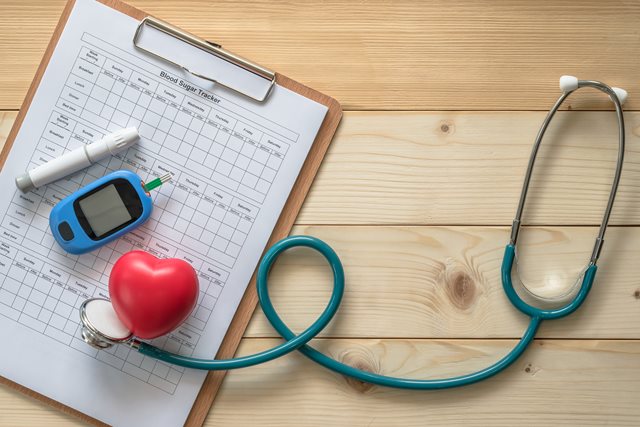Bo Taylor* (whose name has been changed at his request) follows a very healthy diet, swims three to five times a week, and takes his oral diabetes medications as prescribed. His efforts have paid off. Ever since he was diagnosed with type 2 diabetes 15 years ago when he was 60 years old, his overall health has been good and his blood sugar (glucose) levels have rarely been off target.
But this past summer, that changed. Since a hip replacement surgery, his ever-so-predictable blood sugar levels have become unpredictable. “Early in the morning before breakfast, my sugar level will be higher than I expect regardless of what I eat the night before. The level should come down after my physiotherapy exercises, but often it will still be higher than usual,” he says. “I can’t figure out what is going on.”
What affects your blood sugar?
One of the first things people learn when they are diagnosed with diabetes is how food, activity, and medications affect their blood sugar levels.
When blood sugar levels don’t behave the way people expect, it can be very stressful and frustrating,
says Dr. Sonia Butalia, an endocrinologist, and assistant professor of endocrinology and metabolism in the Departments of Medicine and Community Health Sciences at the University of Calgary.
She explains that many things can cause changes in blood sugar levels, including surgery. An operation and anesthesia can cause nausea, vomiting, and pain as well as changes in appetite, activity, and weight. While these effects may disappear shortly after the surgery, the effect on blood sugar can linger for many weeks, says Butalia. She explains that many things can cause changes in blood sugar levels, including surgery. An operation and anesthesia can cause nausea, vomiting, and pain as well as changes in appetite, activity, and weight. While these effects may disappear shortly after the surgery, the effect on blood sugar can linger for many weeks, says Butalia.
Stress can also play a role in blood sugar control. People may see significant differences in their blood sugar levels during the week versus the weekend, for example, or during a busy time of year compared to their holidays. Another reason blood sugar levels might be affected in these periods is simply because people may be changing their eating and activity habits.
Butalia suggests tracking blood sugar levels along with food (when, what, and how much you are eating), activity (when, what, and how hard you are exercising), medication, stress factors, and sleep (when, how much, and how well you are sleeping). “This can be very useful information for your diabetes team. They can spot patterns [in what you are doing and eating] and help develop personalized strategies to improve your blood sugar control,” she says.
What about insulin?
“People tend to blame themselves when their blood glucose levels go up and down. But that is not being fair to themselves, as other factors are often present. For example, the cause may be the type of insulin they use,” says Toronto-area endocrinologist Dr. Ian Blumer. People who take insulin for their type 1 or type 2 diabetes should be aware that NPH (intermediate-acting) insulin can vary in its action from day to day, sometimes by as much as 50 per cent, depending on the rate at which it is absorbed. (The rate of absorption can be affected by several factors, such as diet, activity, and illness.) “If you take 10 units of NPH insulin nightly, some nights it might act like eight units, sometimes like 12 units,” says Blumer.
Newer, longer-acting insulins have a more consistent effect on blood sugar levels. Blumer explains, “If a person is taking, for example, NPH or a long-acting insulin like Lantus or Levemir, and having erratic blood glucose levels, switching to Toujeo or Tresiba [both newer long-acting insulins] may improve things.” (Lantus and Toujeo are two brand names for the drug insulin glargine; Levemir is the brand name for insulin detemir; Tresiba, for insulin degludec.) Alternatively, for some people, another strategy that can lessen sharp swings in blood sugar levels is to use an insulin pump (which only uses rapid-acting insulin), allowing them to instantly adjust their insulin dose as needed. (For more information about personal insulin needs, talk to your diabetes care professional; you can also read more at Getting Started with Insulin.)
The timing and location of insulin injections may also affect blood sugar levels. Blumer reminds his patients to take their mealtime (rapid-acting) insulin 15 minutes before eating to give it enough time to work.
He also cautions against always using the same spot to inject insulin. This can cause a buildup of fat under the skin (known as lipohypertrophy), which can affect insulin absorption, leading to unpredictable blood sugar levels. “The key is to move your injection site around; don’t fall into the habit of having a ‘favourite site’ to inject,” he says.
What else should you know?
Constantly changing blood sugar levels should never be ignored. They may be a warning sign of another health condition, such as celiac disease (an autoimmune disease characterized by sensitivity to gluten) or gastroparesis (a form of nerve damage that affects the stomach, causing it to take too long to empty its contents).
“I have never seen a person who has erratic blood glucose that we can’t do anything about,” says Blumer. “There are always options. Make sure you get the care you need and deserve.”
The last word
“Because I have a history of type 2 diabetes in my family, I have always been very careful to manage my blood sugar. It is so frustrating to suddenly see the numbers go up.”—Bo Taylor*, person living with type 2 diabetes
“If you are experiencing challenges with your blood sugar control, remember you are not alone. Talk to your diabetes care team. They are there to help.” —Dr. Sonia Butalia, endocrinologist
“The first thing is to determine whether blood glucose [sugar] levels really are erratic. Sometimes people check their blood glucose only when they think it will be high or low [after eating or exercising, for example]. If that’s the case, of course they will see significant ups and downs.” —Dr. Ian Blumer, endocrinologist
Did you know?
It is important to be able to recognize the symptoms of high and low blood sugar. Low blood sugar (less than 4 mmol/L) can cause confusion, dizziness, and even seizures and death. High blood sugar can cause increased thirst, frequent urination, and a general feeling of unwellness. Over the long term, high blood sugar can lead to complications such as heart attack, stroke, kidney failure, and blindness. Visit Lows & Highs: Blood Sugar Levels to find out how you can keep your blood sugar levels in a healthy range.
(This article appeared in Diabetes Dialogue, Spring 2019)
Related Content

Tools & resources
Take charge of your health with tools and resources from Diabetes Canada.
Get started About Tools & resources
Webinars
Learn more tips and ideas by watching one of our latest webinars.
View webinars About Webinars